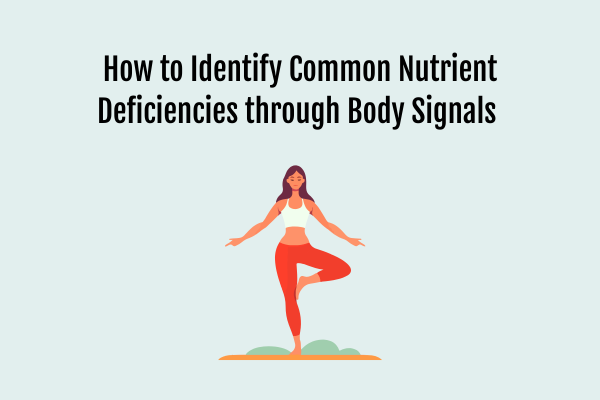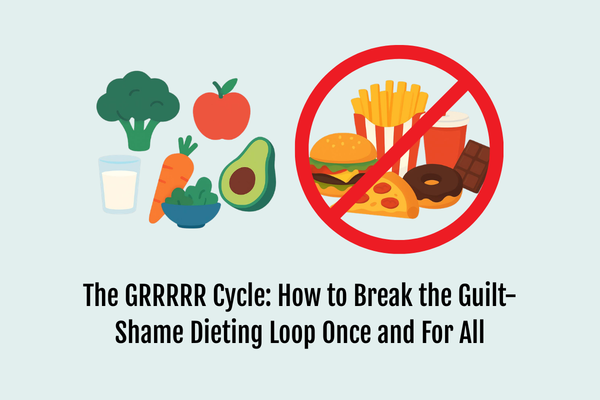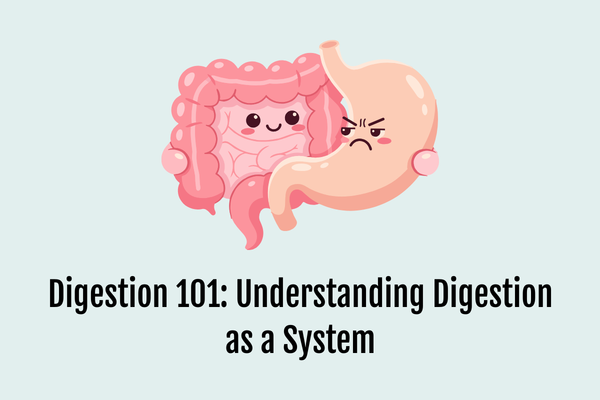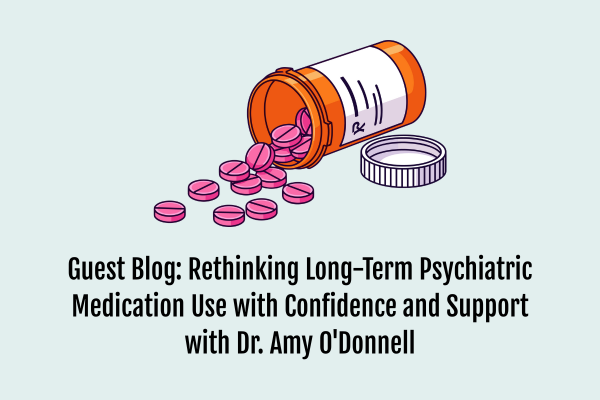How to Identify Common Nutrient Deficiencies through Body Signals
Written by: Sophia Schweiger
Reviewed by: Ava Elliott, MS, RDN, LDN
Nutrient deficiencies are more common than you might think—and they don’t just affect one specific age group, gender, or ethnicity. Individuals often live with symptoms of a nutrient deficiency for years, only to learn their body has been trying to send messages about what it's missing. Whether you’re new to healthful eating, already meal prepping, or working with a dietitian, understanding these signals is key to improving your well-being through personalized nutrition.
This blog will explore the most common nutrient inadequacies, how your body may be signaling them, and how nutrition and meal planning can support better health at every stage of life.
Why Nutrient Deficiencies Happen (Even When You Think You're Eating Balanced)
You might assume that if you’re eating a variety of foods, you’re getting everything you need. But even with the best intentions, nutrient gaps happen.
Some common reasons include:
- Highly processed diets low in nutrient density
- Digestive conditions affecting nutrient absorption (like IBS or celiac disease)
- Certain medications that deplete nutrients
- Increased needs during pregnancy, adolescence, or aging
- Limited sun exposure (affecting Vitamin D)
- Food allergies or restrictive diets (vegan, vegetarian, low FODMAP)
That’s where a registered dietitian comes in—to help you identify these gaps and build a sustainable meal plan that supports your body’s needs.
Let’s Look at Common Nutrients of Concern:
1. Iron Deficiency
Signs Your Body May Be Low in Iron:
- Persistent fatigue
- Pale skin or dark circles under the eyes
- Cold hands and feet
- Frequent headaches
- Shortness of breath during regular activities
- Hair thinning or brittle nails
Iron is critical for oxygen transport throughout your body. A deficiency can affect anyone, but it's particularly common among:
- People who menstruate
- Pregnant individuals
- Children and adolescents in growth spurts
- Endurance athletes
- Individuals following plant-based diets
Nutrition Tip: Include iron-rich foods like lean meats, beans, lentils, tofu, fortified cereals, and dark leafy greens in your meal prep. Pair plant sources of iron—nonheme iron sources—with Vitamin C-rich foods (like bell peppers or oranges) to enhance absorption.
2. Vitamin D Deficiency
Signs You May Be Lacking Vitamin D:
- Muscle aches or weakness
- Low mood or seasonal depression
- Bone pain or frequent fractures
- Frequent infections or slow wound healing
- Fatigue that doesn’t improve with sleep
Vitamin D plays a huge role in bone health, immunity, and mood regulation. It's especially important for:
- Older adults (who may produce less vitamin D from sun exposure)
- Individuals with darker skin tones (melanin can reduce synthesis)
- Those who live in northern climates or spend most of their time indoors
Nutrition Tip: Talk to a Case Specific Dietitian about safe supplementation if your levels are low. You can also add fatty fish (like salmon or tuna), fortified dairy alternatives, and egg yolks to your meal planning routine.
3. Magnesium Deficiency
Signs You Might Be Low on Magnesium:
- Muscle cramps or spasms
- Irritability or anxiety
- Trouble falling or staying asleep
- Irregular heartbeat
- Numbness or tingling
Magnesium is involved in over 300 bodily processes, including nerve and muscle function. Deficiency is more common in:
- People with gastrointestinal disorders
- Individuals with type 2 diabetes
- Older adults
- Those who consume a lot of caffeine or alcohol
Nutrition Tip: Include nuts, seeds, legumes, whole grains, and leafy greens in your meal prep. These foods are magnesium powerhouses!
4. Vitamin B12 Deficiency
Signs of Low Vitamin B12:
- Tingling in the hands and feet
- Memory problems or confusion
- Difficulty walking or balance issues
- Fatigue and weakness
- Glossitis (a swollen, red tongue)
Vitamin B12 supports red blood cell formation and neurological function. At risk populations include:
- Older adults (due to reduced absorption)
- People with gastrointestinal conditions
- Those who follow vegetarian or vegan diets
- Individuals taking certain medications (like metformin or acid reducers)
Nutrition Tip: Add B12-rich foods like eggs, dairy, meat, and fortified plant-based milks to your diet. Your personalized nutrition plan with a dietitian can help determine if a supplement is needed.
5. Calcium Deficiency
Signs Your Body Needs More Calcium:
- Frequent muscle cramps
- Brittle nails
- Numbness or tingling
- Weak or brittle bones
- Abnormal heart rhythms
Calcium isn’t just for bone health—it also plays a key role in nerve transmission and muscle function. Deficiency is more common in:
- Postmenopausal individuals
- People with dairy allergies or lactose intolerance
- Those following a vegan diet
- Those with low intake of calcium-fortified foods
Nutrition Tip: Boost your intake with fortified plant-based milks, tofu, almonds, leafy greens, and canned salmon with bones. Add these ingredients to your next meal plan for a boost in bone-friendly nutrients.
6. Folate Deficiency
Warning Signs of Low Folate:
- Fatigue
- Mouth sores
- Poor concentration
- Irritability
- Changes in hair or skin texture
Folate (or folic acid, its synthetic form) is crucial for cell growth and repair. It’s vital during pregnancy, but also supports heart health and brain function for all.
At-risk groups include:
- People who are pregnant or planning to be
- Individuals with alcohol use disorder
- Those with malabsorption conditions
- Certain genetic variations that affect folate metabolism
Nutrition Tip: Lentils, beans, spinach, and avocado are great sources of folate as well as fortified cereals and bread.
7. Omega-3 Fatty Acids
Signs of Low Omega-3s:
- Dry skin
- Brain fog or difficulty concentrating
- Joint stiffness
- Mood swings
- Fatigue
Omega-3s help manage inflammation, support heart health, and aid brain function. People at risk of deficiency include:
- Those who don’t eat fish regularly
- People following vegan or vegetarian diets
- Individuals with inflammatory conditions
Nutrition Tip: Include fatty fish like salmon, walnuts, flaxseeds, and chia seeds in your meal prep. A dietitian can also recommend high-quality supplements when necessary.
8. Zinc Deficiency
Symptoms of Zinc Deficiency:
- Slow wound healing
- Frequent colds or infections
- Loss of taste or smell
- Hair thinning
- Skin rashes or acne
Zinc is vital for immune function, skin health, and wound healing. Deficiency is more common in:
- Older adults
- People with GI disorders
- Vegetarians and vegans
- Those with high levels of stress or illness
Nutrition Tip: Add pumpkin seeds, chickpeas, beef, and yogurt to your meal plan. These foods are excellent zinc sources and easy to include in a healthy eating routine.
How a Dietitian Can Help You Understand Your Body’s Signals
Nutrient inadequacies can manifest in subtle ways. Instead of guessing what your body needs, a registered dietitian can help by:
- Interpreting symptoms of nutrient deficiencies
- Analyzing dietary patterns for nutrient gaps
- Recommending appropriate testing, as well as interpreting lab results in a nutrition-focused context
- Creating realistic meal plans tailored to your preferences and lifestyle
- Offering ongoing support to make meal prep and healthy eating sustainable
Meal Planning and Prep: Your Best Tools for Preventing Deficiencies
A solid meal planning strategy can help ensure you get a variety of nutrients throughout the week—before a deficiency ever develops.
Simple Meal Prep Tips:
- Build meals around a lean protein, complex carb, and colorful fruits and vegetables
- Rotate leafy greens, grains, and protein sources to boost nutrient diversity
- Add nutrient-dense snacks like Greek yogurt, trail mix, or fruit and nut butter
- Plan for seafood twice a week for omega-3s
- Use a shopping list to stay focused on whole foods
Don’t Ignore the Signs—Your Health Is Talking to You
If you’ve been dealing with symptoms like low energy, poor sleep, mood changes, or skin issues, your body might be asking for nutritional support. Nutrition isn’t one-size-fits-all, and sometimes even a “healthy” diet can miss the mark.
Our team of dietitians at Case Specific Nutrition can help you uncover hidden deficiencies and develop a personalized nutrition plan that works for your body, culture, preferences, and goals.
Reach out to scheduling@casespecificnutrition.com to connect with a Case Specific Dietitian and take the next step toward feeling your best. Our team provides individualized nutrition care across the Greater Pittsburgh area, as well as in Erie, Raleigh, and Tampa.
Disclaimer: The information provided in this blog is for educational purposes only and is not intended to diagnose, treat, cure, or prevent any medical condition. This content is not medical advice and should not be used as a substitute for professional medical care. If you have any health concerns or medical conditions, please consult with a qualified healthcare provider before making any changes to your diet or lifestyle.





.webp)

